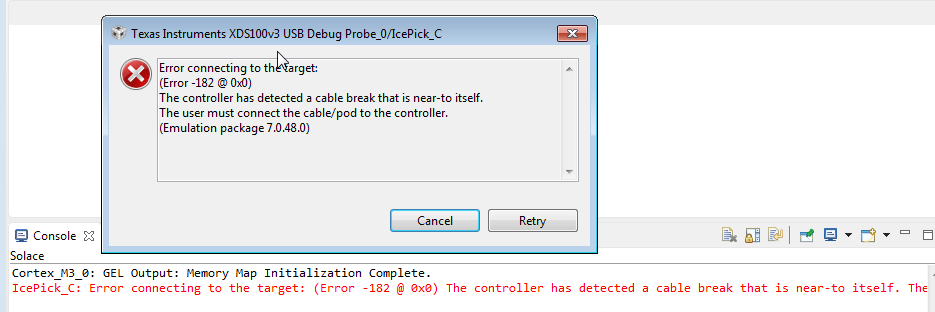Part Number: CC2640
Other Parts Discussed in Thread: CCSTUDIO
Tool/software: Code Composer Studio
I'm trying to set up CCS to match a co-worker. He has no issue with the debugger's ability to program the CC2640, but I do. Swapping hardware with my co-worker indicates this isn't a HW problem, but CCS shows it can verify the connection to the part and the Flash programmer works, pointing to a software/configuration problem. I detail the testing done below and hope someone can give me a reason to further pursue the HW vs SW path.
The programming error (target time out) that occur in CCS appears in 3 variants, all ending with “Load failed” The first variant is the rarest and includes a pop-up window with “cable break that is near-to itself” message as well as a “cable break” message in the console. The second variant has no popup window, but still has a “cable break” message in the console. The 1st and 2nd variants have only been observed on the first connection (upon starting CCS or after power cycling the uC) The 3rd variant has no cable break message and is the most common. The "cable break" message make this seem to be a HW issue, but since I can take the hardware (debugger, my PCB with CC2640 and all the cables) can move to my co-worker's cube and it always works, while his never works for me, it may not be a HW issue.
Variant 1: The error rarely includes a popup window. When the popup window occurs, I can click “retry” and the debugging process continues until the target flashloader had not returned any stats error is printed (same error messages appear in the console as with variants 2 & 3).
Variant 2:
Cortex_M3_0: GEL Output: Memory Map Initialization Complete.
Cortex_M3_0: Failed Board Reset: (Error -182 @ 0x0) The controller has detected a cable break that is near-to itself. The user must connect the cable/pod to the controller. (Emulation package 7.0.48.0)
Cortex_M3_0: GEL Output: Board Reset Complete.
Cortex_M3_0: Target timed out! (Block 1)Cortex_M3_0: Status 0x18146464: Target flashloader has not returned any status. Unknown error!
Cortex_M3_0: File Loader: Memory write failed: Timed out waiting for target flashloader to execute command.
Cortex_M3_0: GEL: File: C:\Users\bakers2\workspace_v7\Solace\Debug\Solace.out: Load failed.
Variant 3 appears on subsequent debug attempt
Cortex_M3_0: GEL Output: Memory Map Initialization Complete.
Cortex_M3_0: GEL Output: Board Reset Complete.
Cortex_M3_0: Target timed out! (Block 1)
Cortex_M3_0: Status 0x77F04273: Target flashloader has not returned any status. Unknown error!
Cortex_M3_0: File Loader: Memory write failed: Timed out waiting for target flashloader to execute command.
Cortex_M3_0: GEL: File: C:\Users\bakers2\workspace_v7\Solace\Debug\Solace.out: Load failed.
Troubleshooting I’ve tried:
- Verify connection in CSS (under Project => properties => resource => general) is almost* always able to verify the connection (pass JTAG DR Integrity scan-test).
- *almost: in a single test, I encountered the "cable break near-to itself" message. On retry, the test passed.
- Trade hardware
- A co-worker has a CCS / CC2640 IDE that programs and debugs fine. We traded hardware (debugger, debugger-PCB ribbon cable, and CC2640 PCBA) and the problem does not follow the hardware. That is, both his hardware and mine debug without issue when connected to his PC and both sets of hardware fail with the same error message when connected to my PC. He has never seen the issue on his hardware and it appear each of 3 times when connected to my PC.
- We didn't trade out USB cables as the connection to the debugger has never been indicated as a failure.
- Program/erase with Smart TF Flash Programmer 2 (v 1.7.5).
- This works without issue and it connect every time, even when CCS is first started.
- Forced mass erase using the flash programmer. All FF, Except eight instances of C5, as expected. After a forced mass erase, my CCFG memory map (All FF, except eight instances of C5) is the same as Brijesh found in this CC1350 thread
- Close programmer & try to debug from CCS => same error message
- Start ccstudio.exe with -clean command line argument
- Used a new workspace
- Project => clean from within CCS
- Changed versions of CCS (I was on the current release (7.2.0.00013) and downgraded to 7.10.00016
- Copied co-worker's environm
- He exported using CCS file-> export...->general-> preferences
- also tried copying contents of '\.metadata\.plugins\org.eclipse.core.runtime\.settings' folder per LINK
- EMC: Compared TDI, TDO, and TCK signals in both locations and they appear identical. Nice, sharp clock edges with very little ringing.
Any guidance on other areas to check and/or reasons to pursue HW issues vs SW issues are appreciated.
Thanks,
Steve



